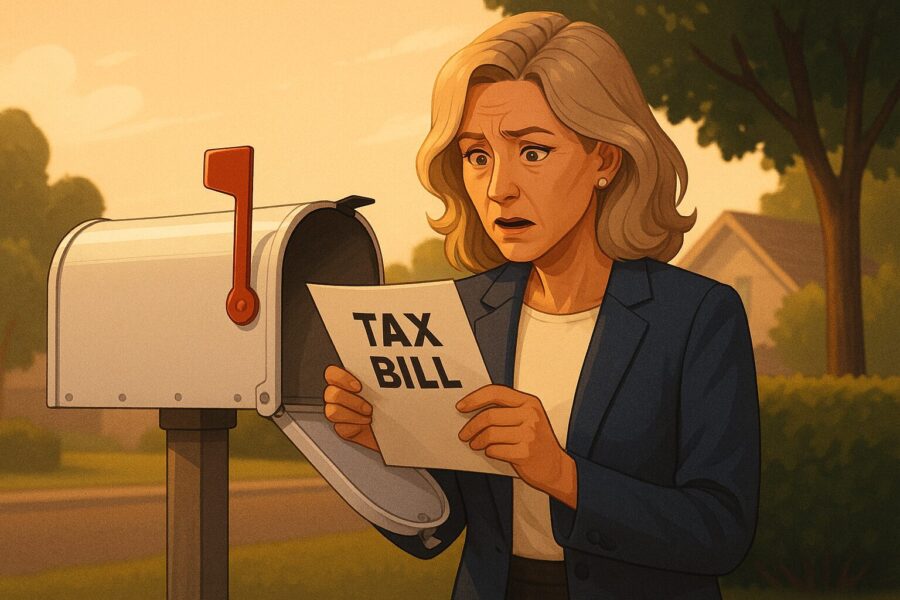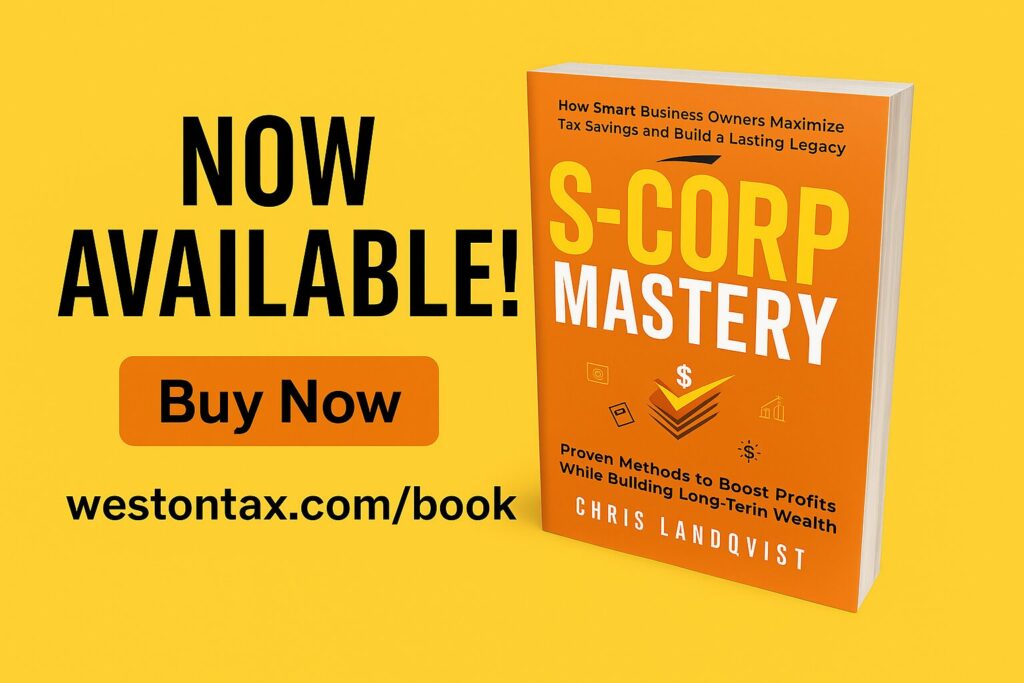As the year winds down, my phone starts lighting up. Business owners and high-income earners call in a rush — voices tight, questions urgent — all asking the same thing:
“Can you help lower my tax bill before it’s too late?”
I get it. I truly do.
Entrepreneurs spend the year running their companies. Managing people, putting out fires, chasing growth. Meanwhile, my team and I spend that same year working with our clients to position them for success… ensuring they keep more of what they earn and send as little as legally possible to Uncle Sam.
But here’s the problem: too many wait until the eleventh hour. They dump a pile of invoices, receipts, and bank statements on their CPA’s desk in January and hope for a miracle.
The truth is, by then, it’s too late for miracles. The most powerful tax-saving moves — your entity structure, income timing, retirement planning, and investment strategy — should’ve been mapped out months before year-end.
Your CPA can’t redesign history; they can only record it. The best tax outcomes are built through proactive planning — not last-minute scrambling.
Know your complete financial picture
To plan effectively, you must get a clear snapshot of your finances — and I mean the whole picture. That means not just revenue, but profit, cash-flow, debt, assets, business-use property, personal income, retirement savings, entity structure effects, and risk exposures.
Ask yourself:
- Do I know my current year-to-date profit (not just sales) and projected profit through year-end?
- Are my bookkeeping and financial reports current and accurate?
- What entity structure am I operating under (LLC, S-Corp, C-Corp, Partnership)?
- Am I taking full advantage of tax elections, retirement plan contributions, business deductions, and pass-through opportunities?
- Do I understand the tax implications (both federal and state) of my business structure and personal income?
Without this clarity, you’re flying blind. Worse, mistakes in entity choice or bookkeeping can cost significantly in taxes, compliance risk, and missed growth-capital opportunities.
As a tax strategist, I often see businesses operating as simple LLCs (default), missing out on the tax-benefits of an S-Corporation election and not paying attention to reasonable salary, distributions, or retirement plan timing.
For instance: an S-Corp allows owner-employees to take part of their income as salary (taxed for payroll) and part as distribution (avoiding some self-employment taxes) — when done properly.
Compliance is your foundation for growth
You might think “compliance” sounds boring or just rules-driven. But in fact, compliance is the foundation that enables strategic tax planning. Without accurate books, proper entity setup, and disciplined operational records, you’re emailing your CPA a mess in January hoping for miracles.
Here’s why compliance matters:
- Accurate books = actionable numbers: If your financials are out of date or messy, you can’t forecast profit, time expense deductions, or plan contributions.
- Proper entity structure = tax-lever readiness: If you form an LLC but don’t vote or file for S-Corp election (when beneficial), you’ve left money on the table. The federal tax code makes clear how S-Corps pass through income and avoid “double taxation.”
- Operational & liability discipline = risk management: Business growth isn’t just about taxes — it’s about mitigating liability, preserving assets, avoiding IRS audit traps (for example, unreasonable owner salaries in S-Corps).
- Timing tax moves = maximizing benefits: For example, choosing when to accelerate expenses or defer income, make retirement plan contributions, or invest in equipment. If you wait until January to decide, many of these windows are closed.
In Short: compliance isn’t a cost — it’s your enabler for strategic tax savings and growth.
What you can do now to mitigate your tax burden
Here are three powerful suggestions you can act on between now and year-end (whether that’s December 31 or your fiscal year-end) to proactively reduce your tax liability.
Suggestion 1: Review entity election and salary/distribution strategy
If your business is currently structured as an LLC taxed as a sole proprietorship (or partnership), ask:
“Would electing to be taxed as an S-Corporation make sense for me?”
First, I would suggest you buy my book and read it. S-Corp Mastery: How Smart Business Owners Maximize Tax Savings & Build a Lasting Legacy will guide you through the best entity that the U.S. has to offer (in my humble opinion).
Many businesses overlook this option. For owner-operators generating significant profit above a reasonable salary, the S-Corp structure can reduce self-employment tax because part of the profit is taken as distribution not subject to FICA.
Action Step #1: After you buy the book and read it cover to cover… sit down with your tax strategist (or bookkeeper plus advisor) this quarter. Assess current profit trajectory, model different salary vs distribution splits, and decide if an S-Corp election is timely (remember the election deadline rules apply).
Also review your current payroll setup so the salary component is clearly documented and “reasonable” for industry/role (to reduce IRS audit risk).
Suggestion 2: Max out retirement plans and time deductible expenses
Another lever many business owners under-utilize is the retirement-plan contribution strategy plus expense timing.
Bigger contributions to your retirement plan lower your taxable income. If you can accelerate deductible business expenses into the current year (e.g., equipment purchases, training, business property improvements), you reduce this year’s taxable profit.
Conversely, deferring income (if realistic and when appropriate) pushes tax liability into later periods when circumstances may differ.
Action Step #2: Review how much you’ve contributed so far to your retirement plan. Ask your advisor: could you increase the contribution before year-end? Also ask whether there are viable business expenses you could accelerate into this year (or income you could push into next, if appropriate). Get your bookkeeper’s help to evaluate and time these moves.
Suggestion 3: Clean up your books and assess year-end profit/loss mix
This step often gets the least attention but is critical. By mid-to-late year you should have books that reflect your true year-to-date profit, including any surprises (positive or negative). This allows you to forecast and plan. If profit is higher than you projected, you may want to accelerate expenses or make strategic investments. If profit is lower, you may focus on growth or decide whether you want to defer income. Without clean books, you’re guessing.
Action Step #3: Make sure your bookkeeping is up to date through at least month-to-date September (or your applicable quarter). Ask your bookkeeper for “profit to date” and “projected year‐end profit” metrics.
Then schedule a call this month to review those numbers and ask: “Do I need to act now (accelerate expenses/invest, defer income), or adjust my tax plan (entity election, salary/distribution, retirement)?”
Real Life Example… a good story.
Just to give you an idea of what can be done with proper planning… I think it shows the power of proper planning.
I recently helped a physician in Texas, who had structured his practice as an LLC by default. Why, you may ask? Well, simply because his previous accountant told him this would help him mitigate taxes compared to a C-Corp. But with the type of income he was generating… he was paying a LOT in taxes every year.
He came to us in July and we immediately discovered their profit projection was going to be ~$550,000 for the year. We quickly modeled an S-Corp election, adjusted payroll, installed a solo 401(k) contribution strategy and moved in a business improvement plan.
In year one we lowered his taxable income by about $270,000, then deployed the savings into other investments that lowered his income further by another ~$145,000.
Because we had the books in order and acted mid-year, the results were powerful. (Yes — this is one of the real cases at Weston Tax Associates.)
Why working with a strategist like Weston Tax Associates changes the game
As that example shows, partnering with a tax strategist isn’t just about filing returns — it’s about unlocking opportunity. At Weston Tax Associates, we’ve built our practice on a simple belief: tax strategy isn’t compliance, it’s a competitive advantage.
Here’s how we help business owners turn tax planning into growth planning:
Holistic review — We don’t treat taxes as a once-a-year event. We monitor business performance during the year, review entity structure, examine salary/distribution strategy, and forecast tax exposure in real time.
Customized modeling — Using real-world data (profit projections, payroll, retirement plan options), we build tailored models showing how choices today impact taxes tomorrow.
Action planning — We produce a clear action list for what to do now (before year-end), including entity elections, retirement contributions, expense timing, and bookkeeping cleanup.
If you want to stop “tax scrambling” and start strategic planning, I invite you to book a free consultation with us. We’ll review your books, entity structure, and goals — and map out a blueprint for lowering your taxes while growing your business. You can setup a free consultation HERE.
Pulling it all together
If you leave tax strategy to January, you’re leaving both time and money behind. Planning early (reviewing your full financial picture, ensuring compliance, exploring entity options, timing contributions and expenses) transforms taxes from an annual headache into a strategic business asset.
Your entity structure isn’t just a paperwork decision — it affects how much tax you pay, how much profit you keep in your business, and how much you can invest in growth. To succeed, you need to embrace a “Culture Of Compliance.” Having clean books, submitting the correct payroll, choosing the proper election filings is the foundation that supports smart tax savings.
And by taking three key action steps now can put meaningful dollars back into your business and away from Uncle Sam. But you have to take action NOW. The longer you wait, the less you can do… and the more expensive it gets. Remember, once December 31st rolls around, it’s too late.
If you’re ready to move beyond year-end panic and start thinking like a strategic business owner, we’re here to help. The difference between scrambling and winning? The plan you build today.
Welcome to the New Age of Accounting. Let’s begin.
P.S. If you found this article helpful, you’ll love my new book S-Corp Mastery: How Smart Business Owners Maximize Tax Savings & Build a Lasting Legacy. It’s now live and available in a sleek, easy-to-read PDF version. Grab your copy here.

Chris is the Managing Partner at Weston Tax Associates, a best-selling author, and a renowned tax strategist. With over 20 years of expertise in tax and corporate finance, he simplifies complex tax concepts into actionable strategies that drive business growth. Originally from Sweden, he now lives in Florida with his wife and two sons.











